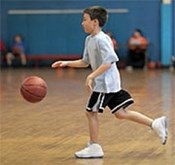U.K. study looked at math, science and English performance.
Getting regular daily exercise of moderate to vigorous intensity may also boost students' academic performance, according to a new U.K. study.
The more intense the exercise, the greater the impact on English, math and science test results, the study authors found. However, they couldn't explain the precise causes behind the connection.
"A number of suggestions have been put forward for why there is a link -- such as physical activity increasing time on task in the classroom, or having an impact on self-esteem," said study researcher Josephine Booth, a lecturer at the University of Dundee, in Scotland.
There may be a biological explanation, she said, with other researchers finding low levels of activity can adversely affect brain structure and function, and affect students' intellectual performance.
Booth also couldn't say for sure whether overall motivation explains the link -- that high-achieving kids do well in exercise and academics. "We were unable to adjust for personality type in the present study," she said.
The study is published online Oct. 21 in the British Journal of Sports Medicine.
Booth's team evaluated nearly 5,000 students enrolled in the "Children of the 90s" study, which is tracking long-term health outcomes of about 14,000 children born in England between 1991 and 1992.
She and her team measured the duration and intensity of the students' daily physical activity for a period of three to seven days when they were aged 11. The students wore a device on their belts to measure activity.
At age 11, both boys and girls were below the 60 minutes recommended for daily exercise. The boys clocked 29 minutes, on average, and the girls, 18 minutes.
Those who exercised the most did better in national academic exams. At age 11, the kids who exercised most had better performance in all three subjects. The activity especially helped the girls' science performance. At ages 13, 15 and 16, the link held.
The researchers accounted for other factors that might affect school performance -- such as social and economic status, birth weight, the mothers' ages at delivery and smoking during pregnancy -- and the link still held.
The new research adds to previous work that has shown a positive effect of physical activity on children's brain functioning and cognitive (thinking) performance, said James Sallis, a distinguished professor of family and preventive medicine and director of Active Living Research, at the University of California, San Diego. He reviewed the new research but did not participate in it.
"One of the impressive aspects of this study is they pinpointed the effects of moderate-to-vigorous activity by adjusting for the effect of total activity, which is mostly light intensity, such as slow walking," Sallis said. "It is more reasonable to expect that higher-intensity activity would have biological effects on the brain that could lead to improved academic performance."
Sallis said he doubts that a student's overall motivation level can explain the findings. "The authors adjusted for socioeconomic status and other factors known to be related to motivation," he said.
According to study author Booth, the findings have important implications for education policy, suggesting that school should value physical activity as a way to improve classroom performance.
More information
To learn more about recommended activity levels for kids, visit the World Health Organization.
SOURCES: Josephine Booth, lecturer in psychology, University of Dundee, Scotland; James Sallis, Ph.D., Distinguished Professor of Family and Preventive Medicine, and director, Active Living Research, University of California, San Diego; Oct. 21, 2013, British Journal of Sports Medicine, online







